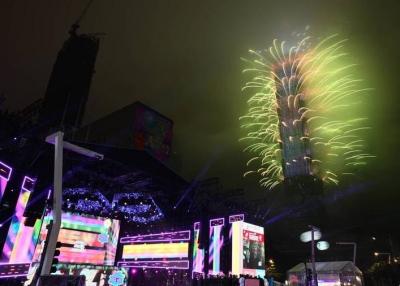China’s exports fell for a second month last month as the global crisis gnawed further into the country’s trade-dependent economy, the government said yesterday, jeopardizing millions more jobs.
Last month also left the Asian giant with its second-largest trade surplus ever, but it was not a sign of health, as it merely reflected an even sharper drop in imports, customs figures showed.
Exports from the world’s fourth-largest economy dropped 2.8 percent last month compared with a year earlier to US$111.2 billion.
It was the biggest fall in a decade, economists said, and highlighted what is becoming an increasingly worrying problem for the Chinese Communist Party as they watch a huge engine of employment slow sharply.
“Millions and millions of manufacturing workers are losing their jobs,” said Chen Xingdong (陳興動), Beijing-based chief China economist for BNP Paribas. “It’s a big challenge.”
The export decline last month followed a fall of 2.2 percent in November, which was the first time in seven years that Chinese exports had shrunk at all, and some observers said the government data was inaccurate.
“The real situation is probably worse than the statistics indicate. That’s what I see on the ground,” said Andy Xie (謝國忠) , an independent economist based in Shanghai.
Some companies are reporting 20 percent drops in exports, especially in the household appliances sector, he said.
The reason why this is not reflected in the overall official trade figures is that many enterprises exaggerate how much they sell to foreign customers so they can benefit from tax incentives for exporters, he said.
The slowdown in exports has hit thousands of companies along China’s eastern seaboard, often set up with investment from abroad.
A significant number are likely to close down their operations during the Lunar New Year at the end of the month, using a time when workers are away on holiday to avoid the hassle of dealing with angry labor, analysts said.
Imports last month were down by 21.3 percent to US$72.2 billion, customs said, suggesting a rapid contraction in domestic economic activity.
The World Bank has warned that China’s economy would expand by just 7.5 percent this year, the lowest level since 1990.
The most spectacular result of China’s steep drop in imports was a trade surplus. which last month came to US$39 billion, customs data showed.
This was only surpassed by the US$40.1 billion in November, which had also resulted mainly from a steep decline in imports.
The figure suggests that China’s full-year trade surplus was US$295 billion, up about 13 percent from 2007, rising to a level comparable to the entire economies of Iran or South Africa.

The Taipei MRT is open all night tonight following New Year’s Eve festivities, and is offering free rides from nearby Green Line stations. Taipei’s 2025 New Year’s Eve celebrations kick off at Taipei City Hall Square tonight, with performances from the boy band Energy, the South Korean girl group Apink, and singers Gigi Leung (梁詠琪) and Faith Yang (楊乃文). Taipei 101’s annual New Year’s firework display follows at midnight, themed around Taiwan’s Premier12 baseball championship. Estimates say there will be about 200,000 people in attendance, which is more than usual as this year’s celebrations overlap with A-mei’s (張惠妹) concert at Taipei Dome. There are

NEW YEAR’S ADDRESS: ‘No matter what threats and challenges Taiwan faces, democracy is the only path,’ William Lai said, urging progress ‘without looking back’ President William Lai (賴清德) yesterday urged parties across the political divide to democratically resolve conflicts that have plagued domestic politics within Taiwan’s constitutional system. In his first New Year’s Day address since becoming president on May 20 last year, Lai touched on several issues, including economic and security challenges, but a key emphasis was on the partisan wrangling that has characterized his first seven months in office. Taiwan has transformed from authoritarianism into today’s democracy and that democracy is the future, Lai said. “No matter what threats and challenges Taiwan faces, democracy is the only path for Taiwan,” he said. “The only choice

CORRUPTION: Twelve other people were convicted on charges related to giving illegal benefits, forgery and money laundering, with sentences ranging from one to five years The Yilan District Court yesterday found Yilan County Commissioner Lin Zi-miao (林姿妙) guilty of corruption, sentencing her to 12 years and six months in prison. The Yilan District Prosecutors’ Office in 2022 indicted 10 government officials and five private individuals, including Lin, her daughter and a landowner. Lin was accused of giving illegal favors estimated to be worth NT$2.4 million (US$73,213) in exchange for using a property to conduct activities linked to the 2020 Chinese Nationalist Party (KMT) presidential and legislative election campaigns. Those favors included exempting some property and construction firms from land taxes and building code contraventions that would have required
TECH CORRIDOR: Technology centers and science parks in the south would be linked, bolstering the AI, semiconductor, biotech, drone, space and smart agriculture industries The Executive Yuan yesterday approved a “Southern Silicon Valley” project to promote the development of an artificial intelligence (AI) and semiconductor industry in Chiayi County, Tainan, Pingtung County and Kaohsiung. The plan would build an integrated “S-shaped semiconductor industry corridor” that links technology centers and science parks in the south, Executive Yuan spokesperson Michelle Lee (李慧芝) said yesterday after a Cabinet meeting. The project would bolster the AI, semiconductor, biotech, drone, space and smart agriculture industries, she said. The proposed tech corridor would be supported by government efforts to furnish computing power, workforce, supply chains and policy measures that encourage application and integration